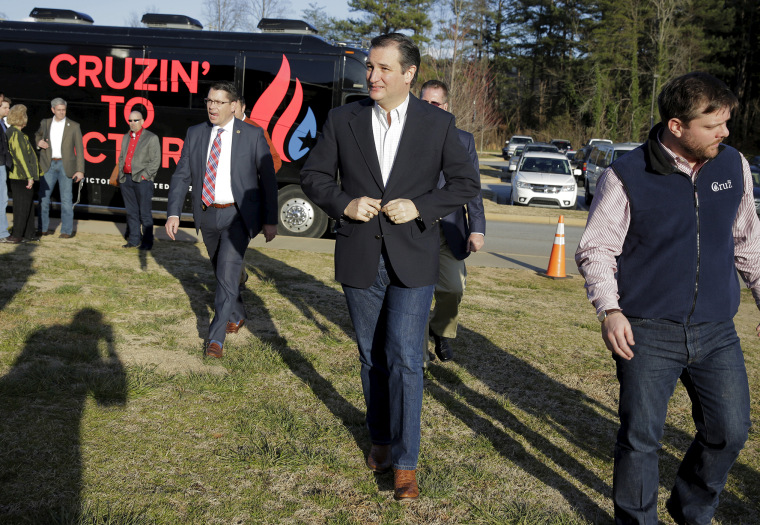In the wake of Donald Trump's double-digit victory in the South Carolina primary, John Kasich told supporters, "Tonight it became a four-person race." Around the same time, Marco Rubio declared, "After tonight, this has become a three-person race." And then there's, Ted Cruz, who argued shortly before the primary that the Republican contest is a "two-man race."
How clarifying.
With Donald Trump having already cruised in New Hampshire and South Carolina, it's difficult to see him as anything but the current frontrunner. The question is who'll be his principal rival as the field narrows and the race enters the next phase.
Rubio, pointing to the Republican establishment's gushing affections, believes he's the one for the job. Cruz, meanwhile, points to his actual performances in the early nominating contests -- he won Iowa, defeated Rubio in New Hampshire, and is one of only two candidates to finish in the top three in each of the contests thus far -- while making the case for himself.
This is bound to go on for a while, but don't overlook the significance of campaign financing. The New York Times has a good piece on this today.
A seven-month, $220 million surge of spending on behalf of mainstream Republican candidates has yielded a primary battle dominated by Donald J. Trump and Senator Ted Cruz of Texas, two candidates reviled by most of the party's leading donors. Now, as they approach a pivotal and expensive stage of the campaign, the two insurgent candidates -- who have won the first three contests -- appear to be in the best position financially to compete in the 11 states that will vote on Super Tuesday, according to reports filed with the Federal Election Commission on Saturday.
For all the Rubio hype, Cruz raised $7.6 million in January -- the best showing of any Republican candidate, and nearly $3 million more than the Florida senator -- and the Texan began the month with $13.6 million in cash on hand, which is also the strongest showing in the GOP field.
As Rachel noted on the show a couple of weeks ago, this is what separates Cruz from previous Republican candidates -- including Rick Santorum and Mike Huckabee -- who've relied on evangelicals and social conservatives as a base. The Texas senator won Iowa, but he has what his like-minded predecessors did not: money.
Some caveats are probably in order. For one thing, this refers to reported campaign fundraising, but it doesn't include affiliated entities like super PACs (though Cruz is faring pretty well on that front, too). For another, we don't yet have a look at February fundraising, and it's a safe bet as the Republican establishment has embraced Rubio with great enthusiasm, his coffers have swelled.
Plus, as Jeb Bush can attest, money isn't everything.
But the nature of the race is about to change. Retail politicking is key in places like Iowa, New Hampshire, and South Carolina, where voters expect to shake your hand, look you in the eye, and kick the proverbial tires a bit, but on March 1, Republican voters will participate in 10 primaries and 1 caucus. To do well, candidates will rely less on meet-and-greet events at coffee shops, and more on advertising, field operations, and an effective campaign infrastructure.
In other words, looking ahead, competitive candidates will need a lot of money. Much of the GOP sees Ted Cruz as the odd man out, but he has the resources to remain a contender.
